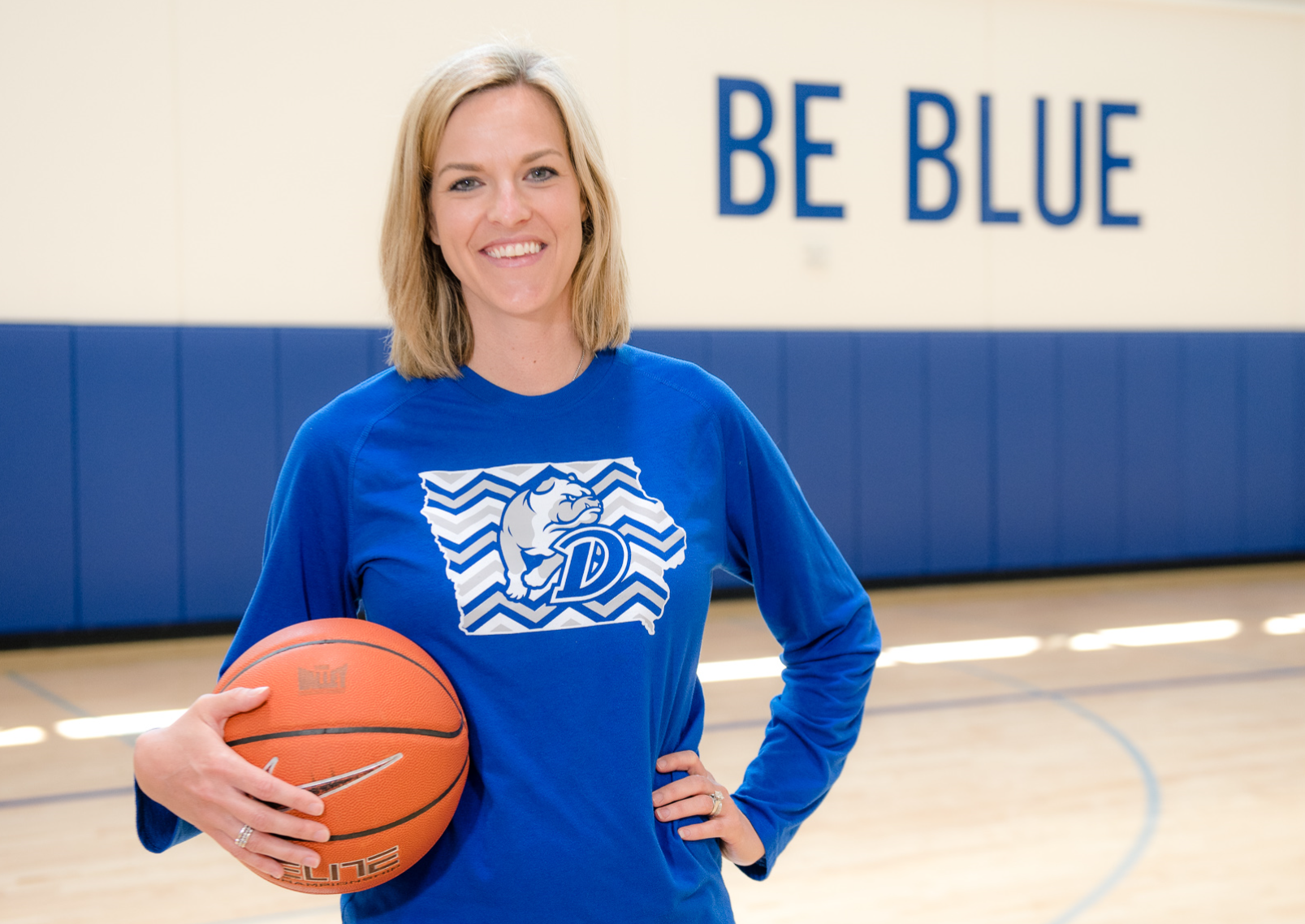Winning Starts with a Positive Culture
Winners have a presence. A spark. Enthusiasm you can sense from a distance. Confidence. An ability to help others channel their very best – and achieve results.
Coach Jennie Baranczyk is all that and more.
Drake University women’s basketball Coach Jenny Baranczyk at home in the Knapp Center (photo by Joseph L. Murphy and Iowa Food & Family Project).
The product of Cedar Rapids took to basketball at an early age and excelled. After graduating from Dowling Catholic, she played for the University of Iowa, earning 2nd-Team All-Big Ten honors her senior season. Following assistant coaching roles at Kansas State, Marquette and Colorado, Jenny was named head coach of Drake Women’s Basketball in 2012.
In her inaugural season, the Bulldogs finished 11-20 and 9th in the Missouri Valley Conference. In 2013, the team went 17-15 and finished 5th. Her third season, 20-11 and 2nd. And in just her fourth season at the helm, the Bulldogs finished 22-10, tied for 2nd in the conference.
Drake finished the 2019-20 regular season 22-8 (14-4 in the conference).
I visited with Coach Jenny in her office tucked deep below Drake University’s Knapp Center about her coaching philosophy, keys to success both as a player and coach and the characteristics of a winner.
Aaron: You often mention the importance of having the “extra stuff?” What is it?
Jenny: It’s the X-factor. For us, it’s talking about how much we love what we do, who we get to do it with and how we get to do it. You need discipline and to work on your craft, but the X-factor is how much you love what you do.
Aaron: It sounds like passion.
Jenny: It’s all about loving what you do. If you love the game, it shows. If you live life with passion, it shows, too. Every woman in this program defines passion by how they play the game and live their life, both on and off the court.
Aaron: How do you channel that passion so you succeed as a team?
Jenny: The highest compliment I can give someone is they’re versatile and can do anything. Those are the qualities we look for. You still have to have an ego and know you’re good to be really good. But you must be really good with that. The detriment of every team is when someone thinks they’re better than everyone else or not as good as the other players on the team. We first must understand what our gifts are, be good with that and bring the very best every day.
Aaron: We often hear about the importance of making good choices. How does it factor into winning?
Jenny: We may not be the very best every day, but it’s a choice to bring our very best every day. We talk about the value everyone brings to the court. We talk about it as a team. Every person has a skillset that’s better than anyone else and that’s a good thing. We need everyone to bring a gift; we have to understand that, promote it and help it flourish. It’s the same thing with our team. Everyone has the green light, must play defense and rebound. When we do that, we celebrate how good we can be as a Drake women’s basketball program. The best teams are when every individual is performing at their very best.
Aaron: What defines Drake women’s basketball?
Jenny: Work ethic. It’s in our DNA as Iowans. If you want something, you must work for it.
Aaron: What role does humility play in winning?
Jenny: A lot. Just doing what needs to be done and not caring who gets credit. Maybe it’s going to the staff room, seeing things that need cleaned up, and just doing it. It’s everyone putting their hands in and getting things done, no matter how insignificant they may seem to be. You can’t tackle the big things if you don’t do the small things first. You can’t solve the entire problem in one shot; it’s getting all the little things done, too. When you achieve something because you worked for it, it feels so good. Other times, you might work hard and not achieve the goal and it feels terrible. But it’s because you understand what success is and what it took to get there that makes you feel that way. I’m always willing to fight for high goals, even if I don’t reach them. The journey to get there is important, too.
Aaron: How does the game of basketball drive personal and professional growth?
Jenny: It teaches you to make choices. There are hard things that are part of our jobs. But we can choose to find love and look for things that are positive. It doesn’t mean that bad things don’t happen and that adversity won’t strike. But we have a choice as to how we react. It’s that way in life and in basketball, too. If you go into practice and your head’s not in a good place, as a team, we’re probably not going to have a good practice. Positivity doesn’t always mean sunshine and won’t guarantee wins, but how you look at things matters a lot.
Aaron: With the pressure to win, how do you keep things loose and enjoy the game?
Jenny: I’m doing my job when the kids are having fun, especially late in the season. The day-to day gets to be grind-time when February arrives. You see it in the big upsets that happen this time of year. But every opportunity to take the court should be fun. If I’m not having fun, then my players aren’t having fun. A leader sets the tone, positive or negative. It can either be a grind and we’re down on each other or we keep it fun and celebrate what we do together. The style of play we run offers a good deal of autonomy and is fun. There’s structure yet flexibility and adjustments made on the fly. After all, if we talk about fun, we must live it every day.
Aaron: You had a very successful career with the Iowa Hawkeyes. What did you learn from Coach Lisa Bluder?
Jenny: She’s a fantastic teacher of the game. Do I teach the same way? No. But I emulate her. For example, our players have autonomy – they can make reads and plays. I don’t coach every play. I want them to make the reads and the plays when they’re under the game lights and on the public stage. They grow into playmakers that way.
Aaron: What else do you teach?
Jenny: Humility, particularly in the context of team-first and not caring who gets credit or fills the stat sheet.
Aaron: How do you recharge your batteries?
Jenny: Finding balance doesn’t mean all things are equal. My life is intermeshed – players can come to my house; I bring my kids to the gym. I’ve become intentional to use the time I have – perhaps it’s 30 seconds or five minutes or the car ride home – to get things done and done right. I set a time to read e-mails or get through stacks of papers. I’ve hired some people to help me get organized so I can make better use of time. There are some areas in my life that I know I need to get better. Life has a way of slowing you down. You need to listen when it tells you to.
Aaron: How do you take an 11-win team to a record of 28-5?
Jenny: The first thing we did was define our culture. We love basketball, competition and Drake. That sounds easy but it’s a journey to get there. We’re very intentional about using the word “love.” This was probably the most important thing we did. We also adapt and adjust as we go. Your foundation must be strong but you never win a championship on plan-A. You must know who you are as a leader and be vulnerable in that space. But there’s a lot of strength in that approach because people want to know who you are. I never seek buy in; I seek all in.
Aaron: What’s it like to be both a parent and coach?
Jenny: You scrutinize things a bit more perhaps. I often say that I’m the worlds’ best coach of everybody else’ team just like I’m the best parent of everyone else’ kids. But I see coaches and the impact they’re having on my own children and its powerful. We can all be coaches and provide our children amazing experiences, whether in sports, theatre or band. We need to be great coaches and build our youth up. They can handle strong truth and positivity. Most of all, make sports and learning fun and bring passion so that our young people can experience something that’s great. We need to do a better job encouraging instead of complaining and provide our children an opportunity to look in the mirror and be proud. Did you have fun? Did you enjoy being a teammate? Did you enjoy being around the game? It’s the journey that’s most special.

